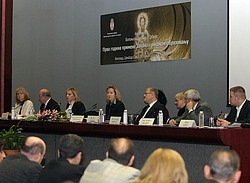- Serbia
Get to know Serbia
- Citizens
Culture and science
Health services
Pension and disability insurance
- Business
Employment
Economy
- Media
- Government
- Contact
Keep in touch
Contact form
Back
Keepin touch
Whether you have a question, comment, suggestion or any problem in the purview of the government, send us your message and we will try to respond as soon as possible. If your problem is not in our purview, we will forward your message to the relevant institution.
Q:
A:
Serbia to implement Bologna declaration fully by 2010
Belgrade,
9 November 2006
Serbian Assistant Minister of Education and Sport for higher education Emilija Stankovic said today that Serbia is expected to fully implement the Bologna declaration by 2010 and thus harmonise its higher education with that of Europe.
Speaking at a conference "Bologna process in Serbia: the First year of implementation of the Law on higher education", Stankovic recalled that since 2003, when the Bologna Declaration was signed, the Ministry of Education and Sport has adopted several rule books, including the one on the registry of institutions of higher education.
A national council for higher education was also formed, as well as an accreditation commission. She added that accreditation norms and standards have been made in line with European criteria and that they are in line with the Law on higher education.
Representative of the Commission for accreditation and verification of quality of higher education institutions Vera Dondur said that accreditations will first be granted to post-secondary schools and then to faculties.
Dondur said that in this way, universities in Serbia will have an opportunity to show the quality of their teaching staff and studies.
According to her, private schools and faculties are also subject to accreditation, while institutions that do not satisfy the criteria will be sent an "act of warning" in order to remove the deficiencies. However, the Commission is not authorised to close institutions of higher education that do not meet the required standards.
Representative of the Council of Europe Sarah Keating said that the implementation of the Law on higher education and the reform of higher education in Serbia will be examined in the Report on the implementation of the Bologna process, which will be presented in one month.
She said that the autonomy of universities, as well as their integration, are crucial for Serbia's entry into the European university community and European integration processes.
Keating recalled that the Parliamentary Assembly of the Council of Europe raised an issue of relaxation of the visa regime for western Balkans countries since that would improve academic exchange and implementation of the Bologna process in Serbia.
A national council for higher education was also formed, as well as an accreditation commission. She added that accreditation norms and standards have been made in line with European criteria and that they are in line with the Law on higher education.
Representative of the Commission for accreditation and verification of quality of higher education institutions Vera Dondur said that accreditations will first be granted to post-secondary schools and then to faculties.
Dondur said that in this way, universities in Serbia will have an opportunity to show the quality of their teaching staff and studies.
According to her, private schools and faculties are also subject to accreditation, while institutions that do not satisfy the criteria will be sent an "act of warning" in order to remove the deficiencies. However, the Commission is not authorised to close institutions of higher education that do not meet the required standards.
Representative of the Council of Europe Sarah Keating said that the implementation of the Law on higher education and the reform of higher education in Serbia will be examined in the Report on the implementation of the Bologna process, which will be presented in one month.
She said that the autonomy of universities, as well as their integration, are crucial for Serbia's entry into the European university community and European integration processes.
Keating recalled that the Parliamentary Assembly of the Council of Europe raised an issue of relaxation of the visa regime for western Balkans countries since that would improve academic exchange and implementation of the Bologna process in Serbia.
-
 Belgrade, 22 January 2025
Belgrade, 22 January 2025Egypt one of Serbia’s closest partners on international stage
-
 Belgrade, 9 July 2024
Belgrade, 9 July 2024Support for 104 associations in diaspora that preserve Serbian language, culture
-
 Belgrade, 15 April 2024
Belgrade, 15 April 2024Competition for StarTech grants open until 31 May
-
 Belgrade, 2 October 2023
Belgrade, 2 October 2023Serbia respects Resolution 1244 and will do everything to preserve peace
-
 Belgrade, 13 September 2023
Belgrade, 13 September 2023Day of Serbian Unity to be celebrated outside borders of Serbia, Republika Srpska for the first time
-
 Belgrade, 8 August 2023
Belgrade, 8 August 2023RSD 24.2m in state aid paid out to citizens affected by storm
-
 Belgrade, 17 June 2023
Belgrade, 17 June 2023Belgrade is doing everything to preserve peace in Kosovo and Metohija
-
 Belgrade, 15 June 2023
Belgrade, 15 June 2023Slovenia will continue to support Serbia on its way to EU
-
 Belgrade, 5 May 2023
Belgrade, 5 May 2023Emergency measures, tightening of conditions for possessing weapons
-
 Belgrade, 3 May 2023
Belgrade, 3 May 2023Three days of mourning in Serbia over tragedy at Vladislav Ribnikar primary school

